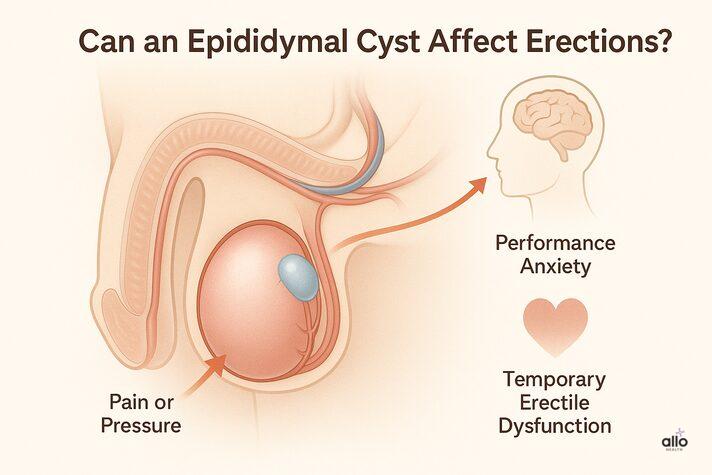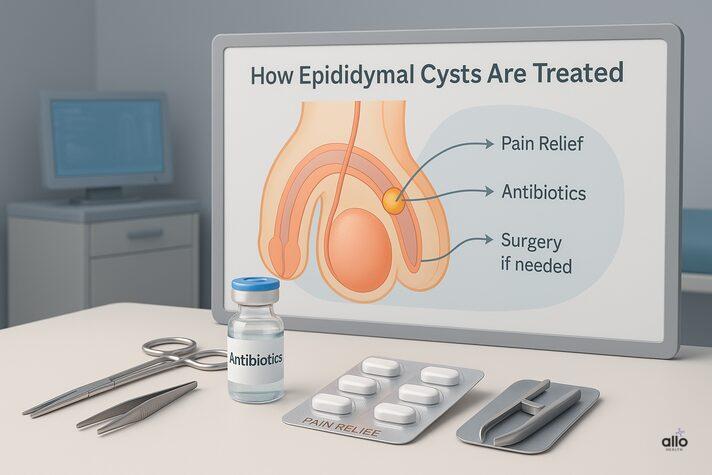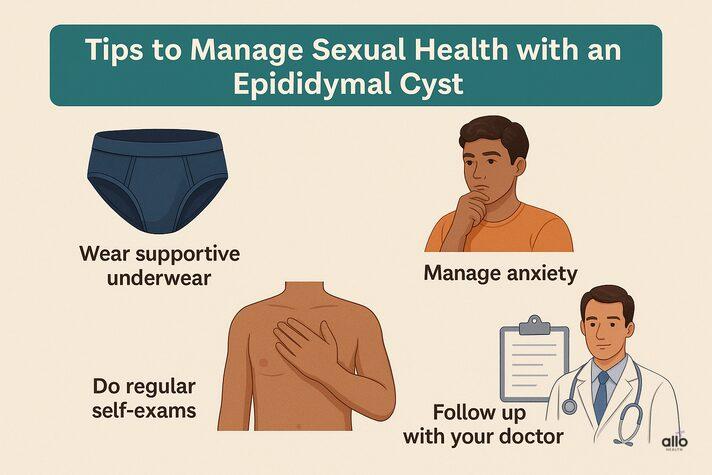Epididymal Cyst and Erectile Dysfunction: Symptoms and Treatment

An epididymal cyst is a small, fluid-filled lump near the testicle that’s usually harmless and non-cancerous. It doesn’t directly cause erectile dysfunction, since it doesn’t affect blood flow, nerves, or testosterone. However, if the cyst becomes painful, large, or causes anxiety, it can indirectly impact sexual comfort and confidence. Most cases need no treatment beyond reassurance and regular check-ups, but if pain, swelling, or erectile issues persist, it’s best to see a urologist for evaluation.
Can epididymal cyst cause erectile dysfunction? It’s a question that crosses many men’s minds the moment they notice a small lump near the testicle. An epididymal cyst, a fluid-filled sac that forms in the coiled tube behind the testicle, is usually harmless, but it can still trigger worry about sexual performance, fertility, or overall health.
The truth is, these epididymal cysts rarely interfere with erections or hormones directly. But their size, pain, or the anxiety they cause can sometimes have an indirect impact on sexual confidence and comfort.
In this article, we’ll break down what an epididymal cyst really is, how it may (or may not) affect your sexual function.
Can an Epididymal Cyst Cause Erectile Dysfunction?
An epididymal cyst doesn’t directly cause erectile dysfunction. It’s a small, fluid-filled sac that develops in the epididymis, the coiled tube behind your testicle that stores and carries sperm.
Usually, it feels like a soft, slightly squishy lump near the top or bottom of the testicle. Most men notice it by touch, and it’s generally painless and harmless. Having an epididymal cyst won’t affect your ability to ejaculate, urinate, or stay active.[1]
Why an Epididymal Cyst Generally Doesn’t Cause ED
- Epididymal cysts are non-cancerous and don’t interfere with blood flow, nerve function, or sexual performance[2].
- They don’t affect your body’s testosterone levels, which means your sexual desire and erectile function remain normal.
According to Allo Health, every 1 in 2 patients has ED, which is based on our internal clinical data of more than 2.5 Lakh patients who come to our clinic.

When Can an Epididymal Cyst Affect Erection
While an epididymal cyst doesn’t directly cause erectile dysfunction, it can sometimes indirectly affect sexual performance, especially if the cyst becomes large, painful, or causes discomfort. These effects are usually secondary, meaning they stem from pain or anxiety, not from a direct problem with blood flow or hormones.
1. Pain and Discomfort
If a cyst grows larger or becomes painful, it can make sexual activity or ejaculation uncomfortable. This discomfort can interrupt arousal or make it harder to maintain an erection[3].
Pain or discomfort → psychological stress → performance anxiety
2. Large Cyst Size
When an epididymal cyst becomes very large, it may create a feeling of pressure or heaviness in the scrotum. This can lead to discomfort while walking or during intimacy, which may indirectly reduce sexual interest or confidence.
3. Associated Conditions
Sometimes, erectile dysfunction is linked to other underlying issues that cause similar symptoms.
For example:
- Chronic epididymitis (long-term inflammation of the epididymis)
- Varicocele[4] (enlarged veins in the scrotum)
Both conditions can cause pain and inflammation, which may contribute to temporary ED.
4. Psychological Impact
Finding a testicular mass can naturally cause worry, stress, or self-consciousness. This mental pressure can lead to performance anxiety, affecting erection quality even when the body is otherwise healthy[5].
Fear of injury or lump → self-consciousness → temporary ED
5. Possible Complications
In rare cases, an untreated or infected cyst may lead to chronic inflammation or minor damage to surrounding tissues such as the spermatic cord[6]. This can briefly affect blood vessels or nerve signals, causing short-term sexual difficulties.
Infection or inflammation → reduced blood flow or nerve sensitivity → temporary ED

How Epididymal Cysts Are Treated
Most epididymal cysts don’t need treatment unless they cause pain or grow larger over time. In most cases, doctors prefer to monitor them with regular check-ups rather than treat them immediately.
1. Observation
- If the testicular lump is small and not causing discomfort, your doctor may recommend watchful waiting.
- Regular monitoring ensures that the cyst isn’t increasing in size or causing new symptoms.
2. Medical Management
If the cyst becomes painful or infected, treatment may include:
- Pain Medication: Over-the-counter painkillers to reduce discomfort.
- Antibiotics: Prescribed if there’s an accompanying infection or inflammation.
3. Surgical Removal (Spermatocelectomy)
- For larger or painful cysts, surgical removal may be advised. This simple outpatient procedure removes the cyst through a small incision in the scrotum.
- But most urologists avoid surgery in younger men who haven’t completed their families, as there’s a small risk of reduced fertility afterward[7].
4. Addressing Psychological Factors
- If erectile dysfunction is linked to stress or anxiety about the testicular lump, therapy, reassurance, or counseling can help.
- Managing fear and performance anxiety often restores normal sexual function once the underlying stress is eased.
When to See a Doctor
A proper evaluation helps confirm the diagnosis and rule out other possible conditions that might need treatment.
You should see a doctor if you notice:
- Pain, swelling, or fever in the scrotal area
- Rapid growth or change in the size of the lump
- Erectile issues lasting longer than 3 months
If ED does occur, a doctor can determine whether it’s related to the cyst or another underlying issue. Early evaluation ensures peace of mind and helps you get the right care at the right time.
Erectile dysfunction linked to an epididymal cyst is usually more psychological than physical. Once we rule out serious causes, reassurance and stress management often make a big difference.

Tips to Manage Sexual Health with Epididymal Cyst
Living with an epididymal cyst doesn’t usually interfere with your sexual health. Most men continue to lead completely normal and satisfying sexual lives. Still, a few simple habits can help you stay comfortable and confident:
1. Wear Supportive Underwear
Testicular support underwear reduces movement and minimizes discomfort during daily activities or exercise.
2. Avoid Trauma or Pressure
Be cautious during physical activities or sports that could strain or injure the scrotal area.
3. Manage Anxiety
Feeling worried about the lump is common, but stress and overthinking can sometimes affect sexual performance more than the cyst itself. Relaxation, counseling, or open communication with your partner can help.
4. Do Regular Self-Exams
Check for any changes in the size or feel of the cyst once a month.
5. Follow Up With Your Doctor
Occasional scans or check-ups ensure that the cyst remains harmless and doesn’t require treatment.
Bottom Line
So, can an epididymal cyst cause erectile dysfunction? The short answer is no, it doesn’t directly interfere with erections. Most cysts are harmless and don’t affect sexual function at all. But if the lump causes discomfort or stress, that tension can sometimes spill over into the bedroom. Pain, anxiety, or overthinking can make it harder to relax and enjoy intimacy.
If you’re dealing with ED along with a cyst, it’s usually due to something else, like blood flow, hormones, or even certain medications. A quick chat with a urologist or sexual health specialist can help clear up the confusion, ease your mind, and guide you toward the right treatment.
"The following blog article provides general information and insights on various topics. However, it is important to note that the information presented is not intended as professional advice in any specific field or area. The content of this blog is for general educational and informational purposes only.
Book consultation
The content should not be interpreted as endorsement, recommendation, or guarantee of any product, service, or information mentioned. Readers are solely responsible for the decisions and actions they take based on the information provided in this blog. It is essential to exercise individual judgment, critical thinking, and personal responsibility when applying or implementing any information or suggestions discussed in the blog."






